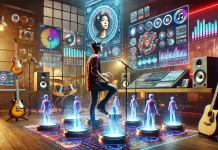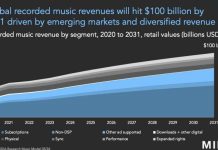Artificial intelligence is transforming music production. This article investigates how AI is influencing the creation and composition of music.
AI-Powered Tools
AI-powered tools like Amper Music and AIVA are enabling artists to compose music with the help of algorithms. These tools can generate melodies, harmonies, and even complete compositions, offering a new dimension to music creation. Amper Music, for instance, allows users to create royalty-free music by customizing pre-made samples, while AIVA is known for composing classical music that rivals human compositions.
Enhanced Creativity
AI is enhancing creativity by providing artists with new ways to experiment with sounds and styles. Musicians can explore different genres and techniques, pushing the boundaries of traditional music production. For example, AI can help generate novel chord progressions or suggest unique arrangements that an artist might not have considered. This fusion of human creativity and AI innovation leads to unprecedented artistic possibilities.
Efficiency and Productivity
AI tools can automate repetitive tasks, such as mixing and mastering, freeing up time for artists to focus on the creative aspects of music production. This increases efficiency and productivity in the studio. Platforms like LANDR use AI to master tracks, ensuring high-quality sound without the need for expensive studio time. Additionally, AI-driven plugins can quickly fix audio issues, streamline workflows, and enhance overall production quality.
Collaboration Opportunities
AI also facilitates collaboration by allowing artists to work with virtual musicians and composers. This opens up new possibilities for creative partnerships and innovative projects. For instance, Google’s Magenta Studio offers tools that enable musicians to collaborate with AI to create music. These AI collaborators can suggest melodies, rhythms, and even entire compositions, providing a fresh perspective and expanding the creative process.
Personalized Music Experiences
AI is also revolutionizing how listeners engage with music by creating personalized experiences. Streaming services like Spotify and Apple Music use AI algorithms to curate playlists tailored to individual tastes. These recommendations are based on listening history, preferences, and even mood, ensuring that listeners discover new music that resonates with them.
Challenges and Ethical Considerations
While AI offers many benefits, it also raises ethical considerations. The role of AI in music creation and the potential impact on human musicians are important discussions in the industry. There are concerns about the originality and authenticity of AI-generated music, as well as the potential for AI to replace human creativity. Additionally, issues of copyright and ownership of AI-composed music are complex and evolving. Musicians and industry professionals must navigate these challenges to ensure that AI serves as a tool that enhances, rather than diminishes, the human element of music creation.
The Future of AI in Music
As AI technology continues to advance, its role in music production is likely to grow. Future developments could include even more sophisticated AI tools that offer deeper insights into music composition and production. The integration of AI with virtual reality (VR) and augmented reality (AR) could also create immersive music experiences that were previously unimaginable.
Explore the impact of AI on music production at Music Industry Weekly.
Artificial intelligence is revolutionizing the way we create and produce music.







